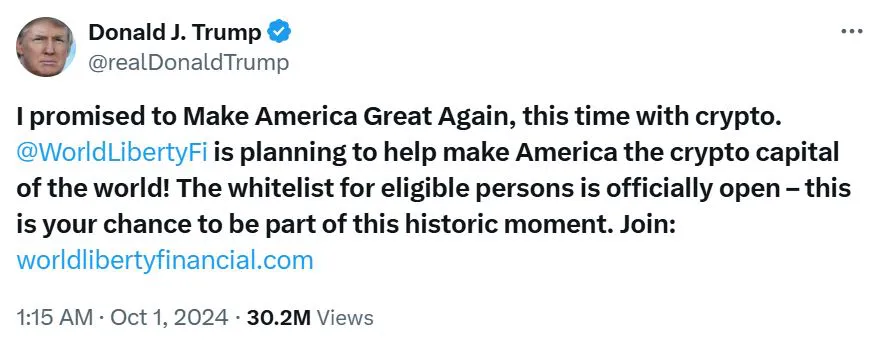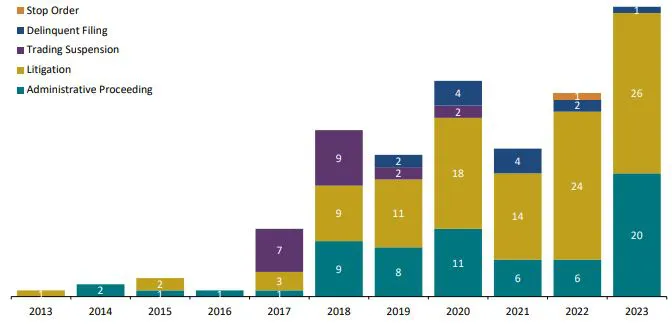In the lead up to the United States presidential election, Republican candidate Donald Trump made more than a few promises for the crypto industry. Now that he has beenelected, big changes could be on the horizon.
As it became clear Trump had beaten Democratic candidate Kamala Harris for the White House, Bitcoin stormed to a new all-time high and has continued to climb, reaching $76,872 as of Nov. 7, according to CoinGecko.
Speaking to Cryptopolitan, Alice Liu, head of research at CoinMarketCap, said Trump’s victory could continue to “shake things up” in the crypto industry.
During his campaign, Trump positioned himself as an ally of the crypto industry, promising to make the US the “crypto capital of the world” through various measures, such as no tax on crypto and calling for Bitcoin to be made and held on American soil.

“His plans include dismantling current regulatory frameworks, appointing a Bitcoin and crypto advisory council to lead the SEC,” Liu said.
“He also discussed reducing regulatory hurdles for the industry – marking a sharp contrast to the Biden administration’s focus on strict oversight and consumer protection,” she added.
However, Liu thinks one promise in particular could prove a massive boon for the crypto industry in the long run.
“Trump’s idea to create a strategic Bitcoin reserve could legitimize Bitcoin as a key asset,” she said.
“If successful, the US would be the first major economy to treat Bitcoin as a reserve asset, which could attract institutional investment and send a strong signal to other countries about the viability of cryptocurrencies.”
US crypto industry policy under Trump
Trump’s second presidential term won’t officially begin until Jan. 20, 2025, on Inauguration Day.
Jonathan Jachym, global head of policy at crypto exchange Kraken, told Cryptopolitan the election outcome is likely “a significant turning point for crypto policy.”
Under the Biden administration, the Securities and Exchange Commission (SEC), through chair Gary Gensler, cracked down heavily on crypto firms.
According to research by litigation consulting firm Cornerstone Research, SEC enforcement actions under Gensler hit a 10-year high in 2023, with the majority of those involving crypto firms.

The agency has yet to release its annual enforcement report for fiscal 2024 actions. However, in an Oct. 21 notice, the SEC’s Division of Examinations released priorities for 2025, listing crypto as an examination priority.
During his campaign, Trump vowed to fire Gensler on day one in office.
“President Trump and his team made crypto an important part of their campaign platform and we saw many new pro-crypto members elected to Congress from both parties,“ Jachym said.
“Our lawmakers and industry have worked very hard over the last several years to progress non-partisan legislation to regulate centralized intermediaries, not code.“
A mixed bag for crypto markets
Cory Klippsten, CEO at Bitcoin platform Swan Bitcoin, told Cryptopolitan that he thinks Trump’s victory could prove to be a mixed bag, “with a mix of pro-business rhetoric and some anti-crypto sentiment from those looking to protect the USD status quo.”
Critics of crypto have flagged it as a potential threat to the dominance of the US dollar in the global economy by reducing the reliance of other countries on the US financial system.
“Trump’s administration could impose short-term headwinds on Bitcoin by maintaining a harsh stance on digital assets, likely lumping them in with his views on other disruptive technologies,“ Klippsten said.
“But Trump’s lack of regulatory interference may also favor Bitcoin’s growth as an unregulated, decentralized store of value. Ultimately, Bitcoin doesn’t need government approval—it thrives on its independence.“
Relaxing regulations could be on the cards
Speaking to Cryptopolitan, Greg Magadini, director of derivatives at crypto data firm Amberdata, said the most prominent medium-term effects of the Trump presidency could be the relaxation of regulations against builders in the space.
“Freeing Ross Ulbricht and firing Gary Gensler enables protocol builders to feel confident the government isn’t against them,” he said.
“This is very constructive for L1 chains such as Eth and Solana, whose value is derived from protocols being built and used on the L1,” Magadini added.
Overall, Magadini thinks “DeFi will be a massive winner out of this,” with a potential “relaxation of US citizen restrictions against protocol use” down the track.
While Trump has been grabbing all the headlines, Magadini says in the background that over 219 pro-crypto candidates and counting have now been elected to the House of Representatives and Senate.
While he is sceptical that a Bitcoin reserve will come to fruition, he says the idea behind the reserve and the influx of pro-crypto candidates are making the market “bullish.”
Since the election, the crypto market has been up across the board, with Bitcoin as the obvious standout as it hits new all time highs.
In the lead up to the United States presidential election, Republican candidate Donald Trump made more than a few promises for the crypto industry. Now that he has beenelected, big changes could be on the horizon.
As it became clear Trump had beaten Democratic candidate Kamala Harris for the White House, Bitcoin stormed to a new all-time high and has continued to climb, reaching $76,872 as of Nov. 7, according to CoinGecko.
Speaking to Cryptopolitan, Alice Liu, head of research at CoinMarketCap, said Trump’s victory could continue to “shake things up” in the crypto industry.
During his campaign, Trump positioned himself as an ally of the crypto industry, promising to make the US the “crypto capital of the world” through various measures, such as no tax on crypto and calling for Bitcoin to be made and held on American soil.

“His plans include dismantling current regulatory frameworks, appointing a Bitcoin and crypto advisory council to lead the SEC,” Liu said.
“He also discussed reducing regulatory hurdles for the industry – marking a sharp contrast to the Biden administration’s focus on strict oversight and consumer protection,” she added.
However, Liu thinks one promise in particular could prove a massive boon for the crypto industry in the long run.
“Trump’s idea to create a strategic Bitcoin reserve could legitimize Bitcoin as a key asset,” she said.
“If successful, the US would be the first major economy to treat Bitcoin as a reserve asset, which could attract institutional investment and send a strong signal to other countries about the viability of cryptocurrencies.”
US crypto industry policy under Trump
Trump’s second presidential term won’t officially begin until Jan. 20, 2025, on Inauguration Day.
Jonathan Jachym, global head of policy at crypto exchange Kraken, told Cryptopolitan the election outcome is likely “a significant turning point for crypto policy.”
Under the Biden administration, the Securities and Exchange Commission (SEC), through chair Gary Gensler, cracked down heavily on crypto firms.
According to research by litigation consulting firm Cornerstone Research, SEC enforcement actions under Gensler hit a 10-year high in 2023, with the majority of those involving crypto firms.

The agency has yet to release its annual enforcement report for fiscal 2024 actions. However, in an Oct. 21 notice, the SEC’s Division of Examinations released priorities for 2025, listing crypto as an examination priority.
During his campaign, Trump vowed to fire Gensler on day one in office.
“President Trump and his team made crypto an important part of their campaign platform and we saw many new pro-crypto members elected to Congress from both parties,“ Jachym said.
“Our lawmakers and industry have worked very hard over the last several years to progress non-partisan legislation to regulate centralized intermediaries, not code.“
A mixed bag for crypto markets
Cory Klippsten, CEO at Bitcoin platform Swan Bitcoin, told Cryptopolitan that he thinks Trump’s victory could prove to be a mixed bag, “with a mix of pro-business rhetoric and some anti-crypto sentiment from those looking to protect the USD status quo.”
Critics of crypto have flagged it as a potential threat to the dominance of the US dollar in the global economy by reducing the reliance of other countries on the US financial system.
“Trump’s administration could impose short-term headwinds on Bitcoin by maintaining a harsh stance on digital assets, likely lumping them in with his views on other disruptive technologies,“ Klippsten said.
“But Trump’s lack of regulatory interference may also favor Bitcoin’s growth as an unregulated, decentralized store of value. Ultimately, Bitcoin doesn’t need government approval—it thrives on its independence.“
Relaxing regulations could be on the cards
Speaking to Cryptopolitan, Greg Magadini, director of derivatives at crypto data firm Amberdata, said the most prominent medium-term effects of the Trump presidency could be the relaxation of regulations against builders in the space.
“Freeing Ross Ulbricht and firing Gary Gensler enables protocol builders to feel confident the government isn’t against them,” he said.
“This is very constructive for L1 chains such as Eth and Solana, whose value is derived from protocols being built and used on the L1,” Magadini added.
Overall, Magadini thinks “DeFi will be a massive winner out of this,” with a potential “relaxation of US citizen restrictions against protocol use” down the track.
While Trump has been grabbing all the headlines, Magadini says in the background that over 219 pro-crypto candidates and counting have now been elected to the House of Representatives and Senate.
While he is sceptical that a Bitcoin reserve will come to fruition, he says the idea behind the reserve and the influx of pro-crypto candidates are making the market “bullish.”
Since the election, the crypto market has been up across the board, with Bitcoin as the obvious standout as it hits new all time highs.





